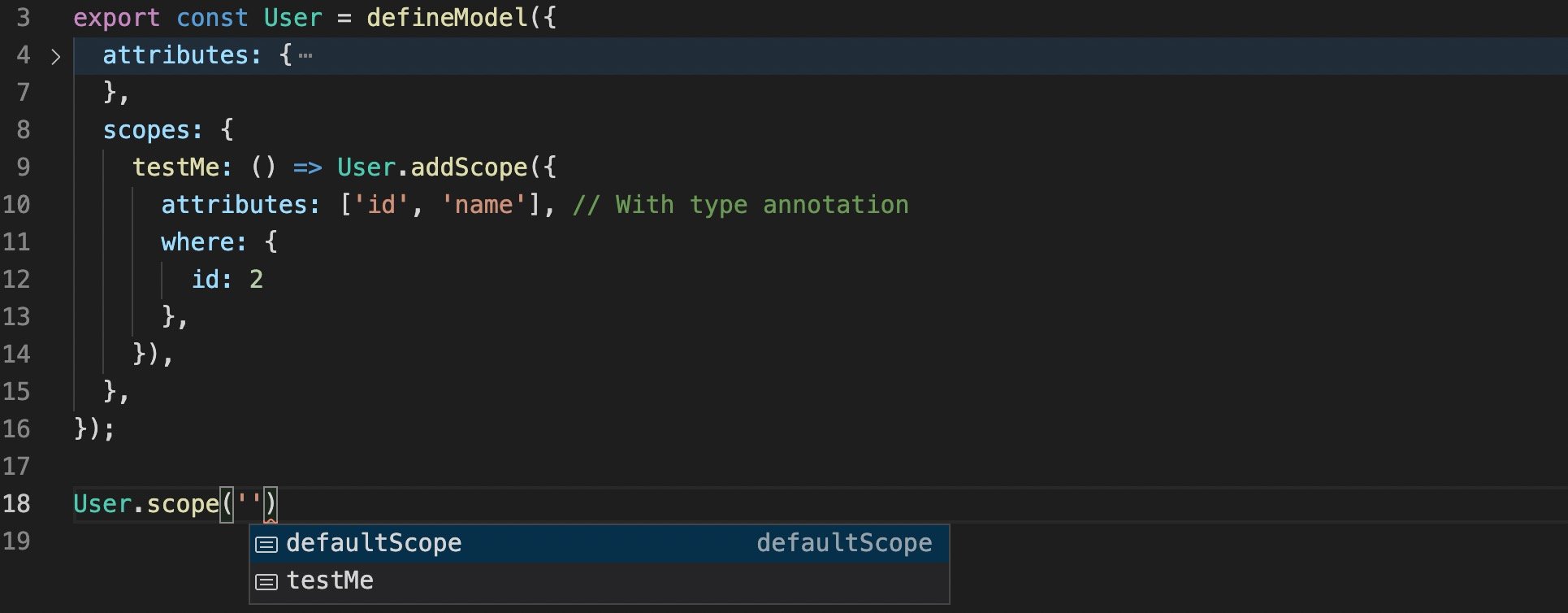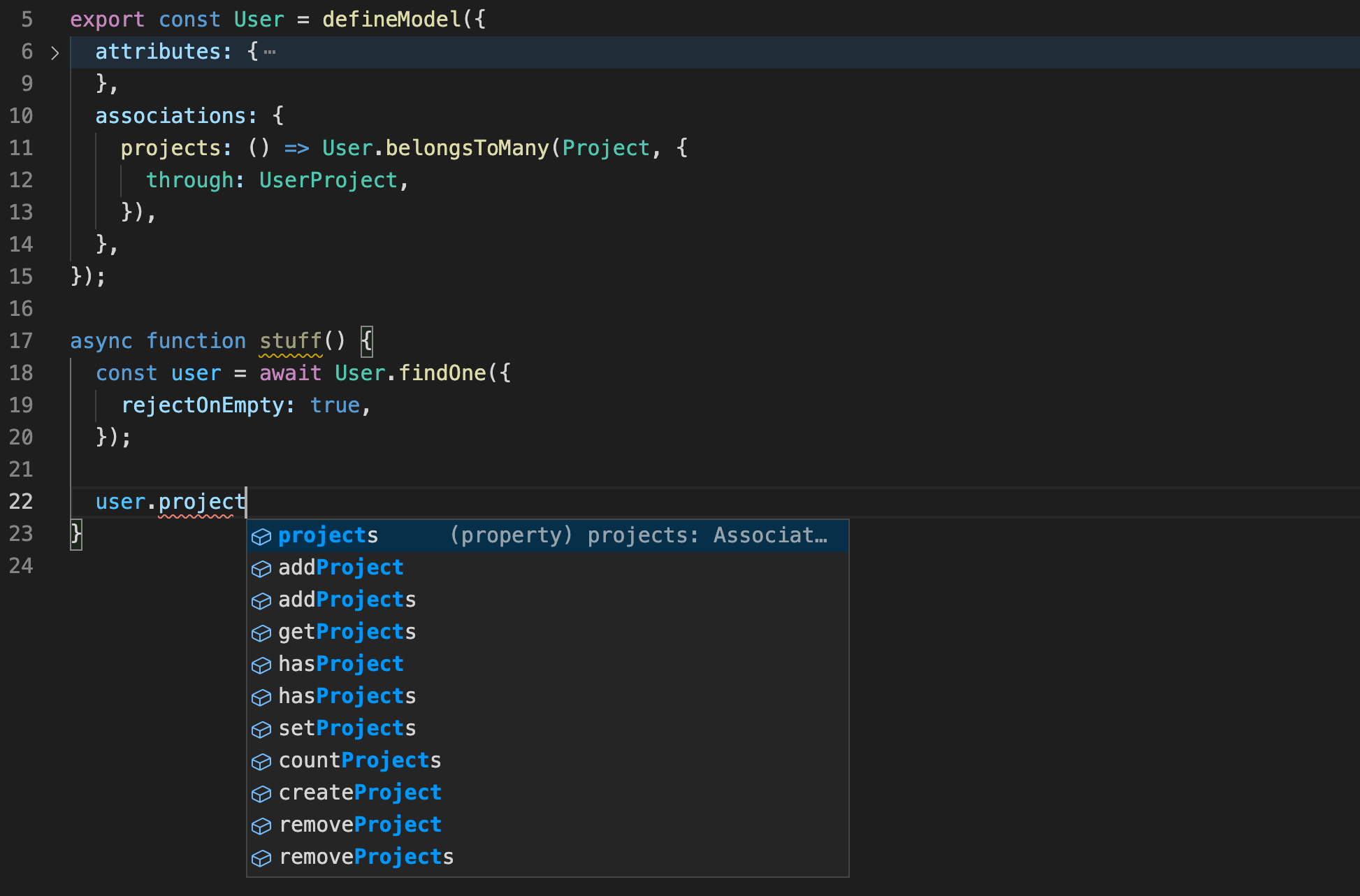qoq-sequelize v0.0.26
qoq-sequelize
qoq orm based on sequelize@6 that totally rewritten type files to make your logic code stronger.
Installation
yarn add qoq-sequelizeYou'll also have to manually install the driver for database from your choice:
# One of the following:
yarn add pg pg-hstore # Postgres
yarn add mysql2
yarn add mariadb
yarn add sqlite3
yarn add tedious # Microsoft SQL ServerRemember DO NOT install package sequelizesequelize-cli
Full documents
Just see the sequelize website, and take a second please to see the minimum engine version which are supported by sequelize.
What's the difference?
Initialization
Before
import { Sequelize } from 'sequelize';
export const sequelize = new Sequelize({
dialect: 'sqlite',
...
});After
import { Sequelize } from 'qoq-sequelize';
export const sequelize = new Sequelize({
modelsPath: './src/models', // optional
migrationsPath: './src/migrations', // optional
seedersPath: './src/seeders', // optional
dialect: 'sqlite',
...
});Attributes
Before
export const User = sequelize.define('User', {
id: {
type: DataType.INTEGER,
primaryKey: true,
},
name: {
type: DataType.VARCHAR,
allowNull: false,
},
});After
import { defineModel, column } from 'qoq-sequelize';
export const User = defineModel({
attributes: {
id: column.int.primaryKey(),
name: column.varChar.notNull(),
},
});What amazing things will happen next?


Scopes
Before
const User = sequelize.define('User', {}, {
scopes: {
testMe: {
attributes: ['id', 'name']
where: {
id: 2,
},
}
},
});After
export const User = defineModel({
scopes: {
testMe: () =>
User.addScope({
attributes: ['id', 'name'], // With type annotation
where: {
id: 2,
},
}),
},
});What amazing things will happen next?

Associations
Before
// Project.ts
export const Project = defineModel('Project', {
id: {
type: DataType.INTEGER,
primaryKey: true,
},
user_id: {
type: DataType.INTEGER,
allowNull: false,
},
title: {
type: DataType.STRING,
allowNull: false,
},
});
// User.ts
export const User = defineModel('User', {});
User.hasMany(Project, {
sourceKey: 'id',
foreignKey: 'user_id',
as: 'projects',
});After
// Project.ts
export const Project = defineModel({
attributes: {
id: column.int.primaryKey().autoIncrement(),
user_id: column.int.notNull(),
title: column.varChar.notNull(),
},
});
// User.ts
export const User = defineModel({
associations: {
projects: () =>
User.hasMany(Project, {
sourceKey: 'id',
foreignKey: 'user_id',
}),
},
});What amazing things will happen next?



BelongsToMany
// UserProject.ts
export const UserProject = defineModel({
attributes: {
user_id: column.int.notNull(),
project_id: column.int.notNull(),
},
});
// User.ts
export const User = defineModel({
associations: {
projects: () =>
User.belongsToMany(Project, {
through: UserProject,
otherKey: 'project_id',
}),
},
});What amazing things will happen next?


5 years ago
5 years ago
5 years ago
5 years ago
5 years ago
5 years ago
5 years ago
5 years ago
5 years ago
5 years ago
5 years ago
5 years ago
5 years ago
5 years ago
5 years ago
5 years ago
5 years ago
5 years ago
5 years ago
5 years ago
5 years ago
5 years ago
5 years ago
5 years ago
5 years ago
5 years ago



